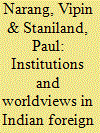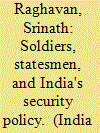| Srl | Item |
| 1 |
ID:
114254


|
|
|
|
|
| Publication |
2012.
|
| Summary/Abstract |
This article explores the intersection of strategic worldviews and domestic institutions in the creation of India's foreign policy.We first show that Indian electoral politics have weak links with foreign policy. Insulated bureaucracies and small groups of elites dominate policy making because most elected officials are focused on winning votes and building coalitions around other issues. The ideas of the strategic elite are thus very important. We then identify major strands of thought among these elites: specifically, the desire for autonomy, distance from alliances, and skepticism of binding international commitments. Though there is heterogeneity, these basic elements can be found across much of the political spectrum. This continuity, despite changes over time in international and domestic politics, suggests that India will continue to pursue freedom of action rather than becoming a close ally of the United States.
|
|
|
|
|
|
|
|
|
|
|
|
|
|
|
|
| 2 |
ID:
114255


|
|
|
|
|
| Publication |
2012.
|
| Summary/Abstract |
This article explores the extent to which Indian domestic debate shapes strategic behavior. It makes the case that domestic politics, and more importantly, the role played by domestic elites-from within the ruling party and the opposition-have historically set limits on the exercise of executive power. Specifically, it maps the relative importance of domestic politics on Indian foreign policy during the Nehru years (1947 to 1964), investigating the tension between elite domestic contestation and India's approach to alliances. In sum, it seeks to recover a part of Indian strategic history that appears to have fallen prey to a dominant historical narrative that is wrapped around the persona, rhetoric, and vision of Prime Minister Jawaharlal Nehru.
|
|
|
|
|
|
|
|
|
|
|
|
|
|
|
|
| 3 |
ID:
114256


|
|
|
|
|
| Publication |
2012.
|
| Summary/Abstract |
This article argues the conventional wisdom on civil-military relations in India needs qualification. Whilst the military has not intruded in the formal machinery of politics, its institutional autonomy and assertiveness have progressively increased since 1947. This increase stems from two factors. First, a series of spikes in external threat-mainly a succession of wars and crises from the early 1960s to the early 1970s-altered the institutional balance of power between civilians and the military in favor of the latter. The second, and more analytically elusive, factor is a growing attitudinal divide between Indian society and its armed force-in other words an increasing civil-military gap. The article contends that the prevailing pattern of civil-military relations has already proved problematic in some important areas of security policy. Unless its more angular aspects are smoothened out, civil-military relations will continue to produce skewed security policies.
|
|
|
|
|
|
|
|
|
|
|
|
|
|
|
|